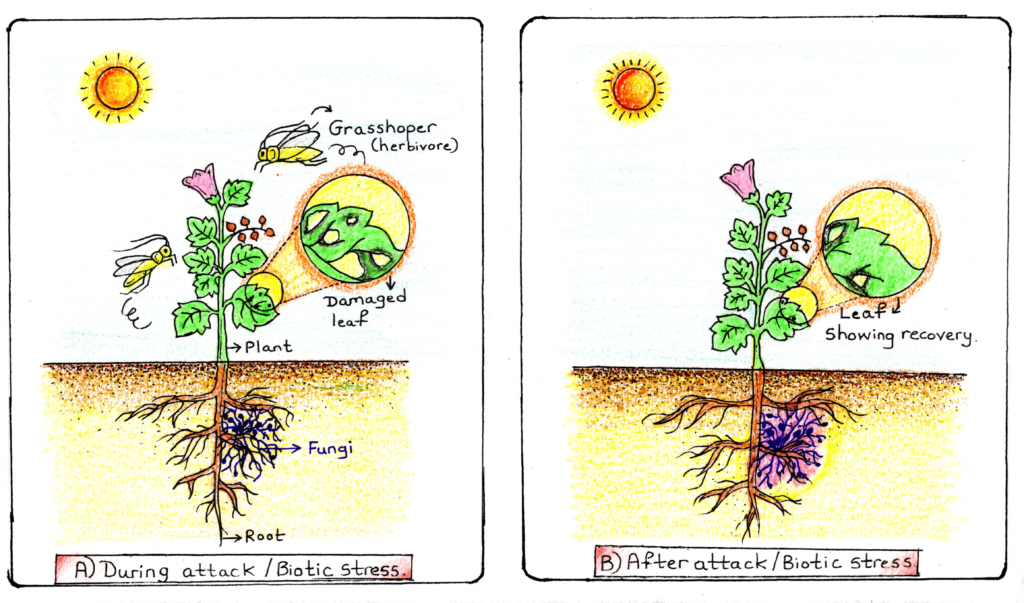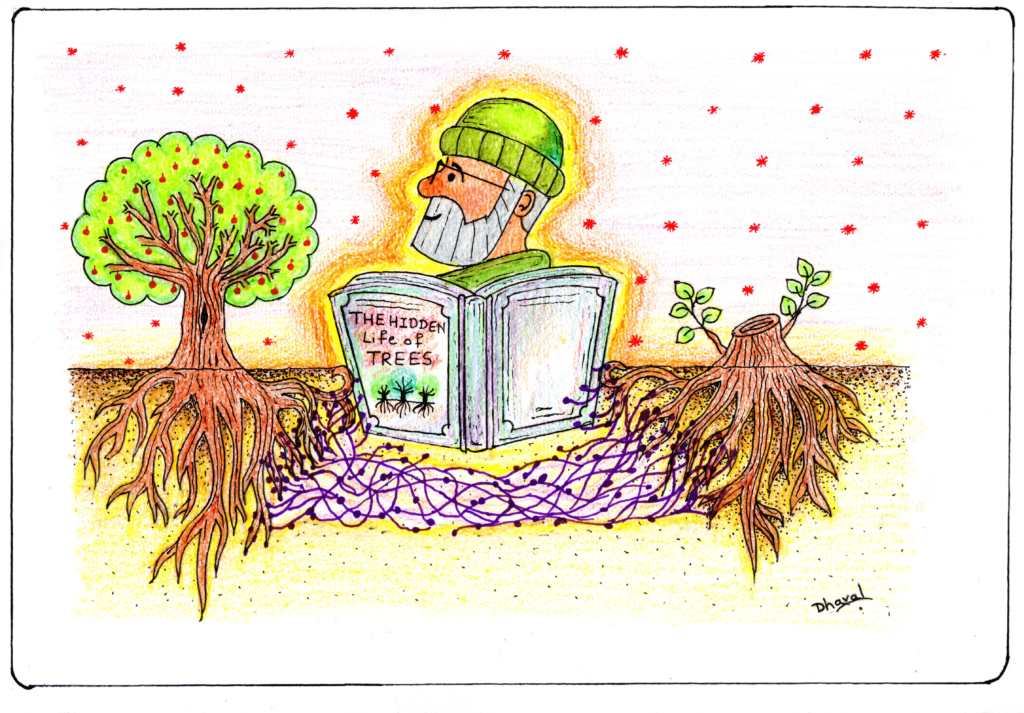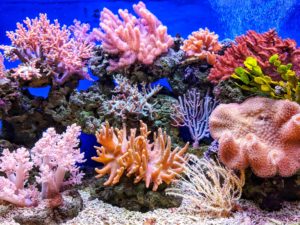“How to get through tough times” by Nature
For the past year, you know who has destabilised our lives (I am just going to say “you know who” because I am sick of that word). Last year we were unprepared, but with a potential second wave, we need to stay strong and get through this together. The greatest philosopher, Nature, has some good advice in store for us:
Standing by your side through tough times
Around 700 million years ago, plants and fungi originated on the earth. Their emergence was vital in altering the earth’s climate and played a big role in the evolution of other organisms. This interdependence formed strong relationships between plants and fungi, and terrestrial animals. One such example is the Plant-Herbivore-Fungus relationship.
Let’s first talk about Plants-Fungi symbiosis. We’re aware that plants obtain water and nutrients from the soil and carbon from the atmosphere to make food. Sometimes, roots are not so efficient in absorbing the nutrients from the soil. That’s where fungi come into the picture. They form a very dense network underground, similar to neurons in our brain, and facilitate roots in absorbing nutrients from the soil. This helps plants grow faster. But what do they get in return? Unlike plants, fungi are heterotrophs, which means that they cannot make their own food. Thus, in return for this favour, plants provide them with food. Roots supply carbon to the fungi, which helps them grow. It’s a win-win, symbiotic relationship! For years, this friendship served them well. Was this friendship ever put to the test? Yes, always. As I mentioned above, plants and fungi helped others and the organisms around them to evolve. This is where Herbivores come into the picture.

Herbivores are animals that feed on plant materials. As these animals (also some insects and other organisms) feed on plants, their existence is threatened, commonly referred to as biotic stress. If the herbivores eat all leaves, a plant may become vulnerable to die. This is when fungi come to the rescue. Herbivory triggers a response in the plants, which increases water and nutrient absorption in the roots. This is to compensate for the loss and regrow or repair damaged leaves. In response to this, the Fungi work harder than usual to help the plant absorb as many nutrients as possible to pump-up leaf production. A friend in need is a friend indeed.

Helping you when you are down
Fungi are seen to form an underground internet. It connects plants through their roots. Carbon transfer between two plants through fungal intermediates (Arbuscular Mycorrhizal Fungi) is a very common phenomenon. Peter Wohlleben, in his book ‘The Hidden Life of Trees,’ says, “They are reluctant to abandon their dead.” By ‘they’, he means trees. Say, if there are two trees adjacent to each other and connected through the “underground internet”, and if one of them is cut, does this mean it’s the end? No, says its neighbour. The tree which is still standing provides necessary carbon to the dead trunk through the fungi network. This helps the trunk to grow some leaves, photosynthesize and grow!
Helping you grow
Enough about the land; let’s dive into the ocean! Coral reefs are the most remarkable creation
of nature I have ever come across. They can literally form continents below the ocean, sustaining the majority of aquatic life. They provide shelter to countless aquatic organisms, they help in carbon sequestration, and they are nature’s water filtration system!

But they, too, have a friend who helps them grow over the years – Algae. Algae are small but diverse aquatic organisms that can photosynthesize. Corals provide algae shelter and shield them from harmful UV rays. They also provide algae with CO 2 and waste as a raw material for photosynthesis. In return, algae supply their photosynthesized nutrients to Corals. Symbiosis with Algae benefits Corals in growing and forming hard structures made of calcium carbonate. It is reported this relationship began 210 million years ago. In recent years, humans are acting as a toxic third wheel in their relationship. The rise in temperatures causes corals to expel algae and turn white – this is known as Coral bleaching.
Now, Covid-19….sorry, you know who is playing a toxic third wheel in your relationships.
For more information on how to deal with it, please follow the link below:
www.pleasestayathomefornow.org
Writer:

Rohit Pawar
Rohit is an ecologist who recently graduated with a bachelor’s degree in Biosciences from Savitribai Phule Pune University. He wishes to devote his life to ecosystem conservation. In his free time, he worries and overthinks about the biggest problems in the world, especially climate change. He thinks that we are 4 Elon Musks away from saving this planet.
Illustrator:

Dhaval Shejwal
Dhaval is currently pursuing his bachelors in Microbiology. Both science and art are his passions. Creativity keeps him going. Scientific data visualization and communication have become the need of time and necessity, as well to break the wall between a lab and home. According to him, “Art is a beautiful reflection of Science, there is art in science and science in art”.

Yet another interesting topic explained in the simplest way. A beautifully written article indeed.